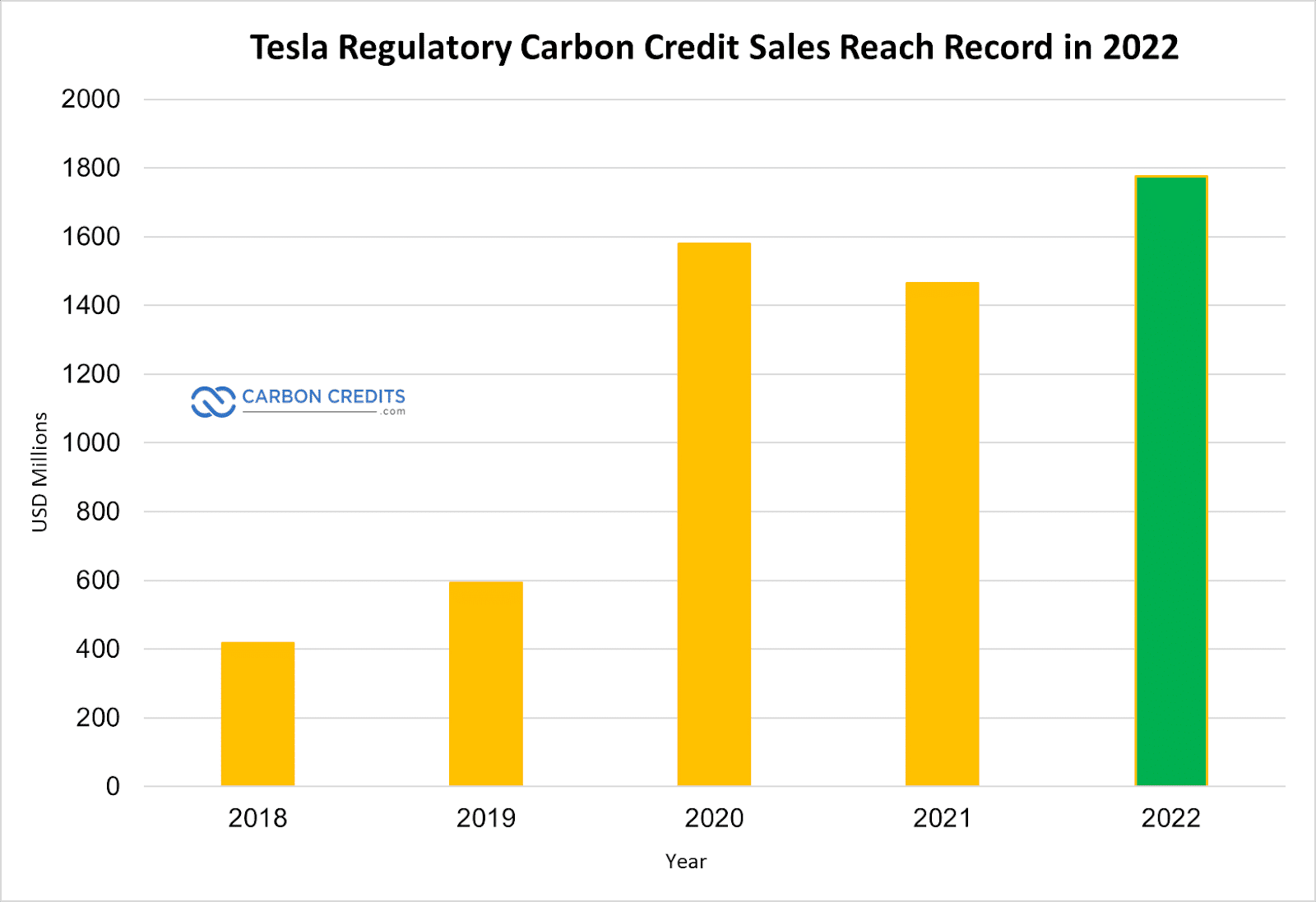Tesla’s carbon credit sales are making headlines again as it reached a new record in 2022. The company reported that Q4 carbon credit sales jumped 47% year over year.
Tesla has been generating revenue from the sale of carbon credits for at least 8 consecutive quarters.
These credits, also known as carbon offset credits or carbon allowances, are a way for companies to offset their carbon emissions by investing in renewable energy and other carbon reduction projects.
Tesla has been selling carbon credits to other automakers. In 2019, the company made headlines when it reportedly earned $357 million from the sale of carbon credits to other car companies that did not meet emissions standards set by the California Air Resources Board (CARB).
This allowed these companies to comply with regulations without having to make significant changes to their own operations.
Tesla has seized the net zero market through many revenue streams including vehicles, solar installations and carbon credits. But the rise of Tesla’s carbon credits sales over the years has proven a steady contribution to revenues and profits.
Rising High: Annual Tesla Carbon Credit Sales
In 2018 Tesla sold $419 million in carbon credits. The big move came in 2020 with $1.58 billion in revenues from the sale of credits. Tesla then stunned the carbon markets with its landmark $679 million credit sales in Q1 of 2022.
This represents a significant portion of Tesla’s overall revenue and highlights the value of the company’s clean energy operations. Tesla’s carbon credits are generated through its clean energy business.
The company operates a solar panel installation business and also sells energy storage systems. These operations generate carbon offset credits through the reduction of greenhouse gas emissions (GHG’s).
Not Just Carbon Credits, Tesla is a Net Zero Leader
Tesla has been a leader in the electric vehicle market since its founding in 2003. The company’s mission is to accelerate the world’s transition to sustainable energy.
In addition to producing electric vehicles, Tesla also operates a solar panel installation business and sells energy storage systems. These operations generate carbon offset credits through the reduction of greenhouse gas emissions. These credits can be sold to other firms, such as automakers, that struggle to meet emissions standards set by regulatory bodies like CARB.
Tesla has sold carbon credits to a number of car manufacturers, including Chrysler, as a way for them to comply with the standards. It’s reported that Chrysler bought US$2.4 billion worth of Tesla’s Carbon Credits, accounting for the majority of the company’s sales in years past. It’s unclear who the major buyers were in 2022.
Credits Help Offset Scope 1, 2 and 3 Emissions
Reducing greenhouse gas emissions requires addressing both energy generation and consumption. This is what the transportation and energy sectors have been prioritizing to directly reduce their emissions.
Companies like Audi, Porsche and Daimler-Chrysler are accelerating their net zero and electrification plans. Audi, for example, aims to have 30 electric vehicle models by 2025 and aims to have 40% volume share of the EV market by the same year.
Tesla designs and manufactures a complete energy and transportation ecosystem, focusing on affordability through research and development, software development and advanced manufacturing capabilities.
Tesla itself has an emissions footprint that it addresses. Here’s how Tesla’s own Scope 1, 2 and 3 emissions looked from their 2021 Climate Impact Report:
You can read about Tesla’s net zero commitments in their 2021 climate impact report.
Tesla’s Role in the Carbon Credit Market
The carbon credit market is a way for companies to offset their carbon emissions by investing in renewable energy and other carbon reduction projects.
Companies that exceed emissions standards set by regulatory bodies can purchase carbon credits from companies like Tesla that are generating carbon offset credits through the reduction of greenhouse gas emissions. By doing so, they can comply with regulations without having to make significant changes to their own operations.
The sale of carbon credits has been a significant source of revenue for Tesla and highlights the value of the company’s clean energy operations. As the world continues to focus on reducing carbon emissions and fighting climate change, the market for carbon credits is likely to grow.
Tesla’s leadership in the electric vehicle market and its commitment to sustainable energy position the company well to continue to generate revenue from the sale of carbon credits in the future.



